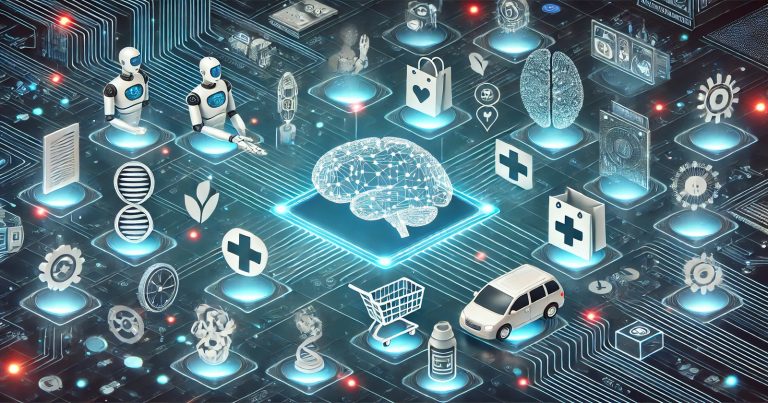Training machine learning applications helps computers learn from data and make decisions. Such tools can vastly improve results and save time in many fields. Today, machine learning models are used in healthcare, finance, education, and marketing. They aid in real-world tasks such as disease detection, fraud detection, smart advertising, and crop health. They speed work, they make work smarter, they make work better. Together, AI and machine learning are helping industries grow faster than ever.
What is AI and Machine Learning?
AI stands for artificial intelligence. It makes machines think like humans. AI systems can make calculations, have conversations, and even play games.
Machine learning is a significant part of AI. It allows machines to learn by example. As we present data to machines, they become skilled at pattern matching. This is how apps recommend movies or doctors catch diseases early. AI is combined with machine learning to refine tools and make calls.
Machine Learning Applications
Machine learning comes in various forms, though. Supervised learning, deep learning, and NLP applications are the most common. These tools can read, talk, and write almost like humans.
Machine Learning in Healthcare
Machine learning in healthcare is changing the way doctors and hospitals do business. It saves lives, detects diseases earlier, and provides better care. It also makes the overworked hospitals run faster without making mistakes.
Improved Diagnosis and Disease Detection
Doctors deploy machine learning tools to find diseases like cancer, heart problems, and diabetes. Machines absorb thousands of patient records and then diagnose much more quickly.
- They read X-rays and scans
- They compare patient history
- They tell you if something doesn’t look good
- This causes doctors to discover problems sooner. Many hospitals have adopted predictive analytics using machine learning. That means they can predict health risks before they occur.
Personalized Treatment
Machine learning allows doctors to provide personalized treatment plans. Every patient is different. So, based on age, body type, and previous disease, the machine gives the best plan.
- Saves time for doctors
- Reduces wrong medicine
- Increases patient trust
Hospital Management
Large hospitals have machines that manage beds, staff, and medicines. It cuts down waiting time. It also allows for more efficient surgery planning.
| Use Case | Machine Learning Benefit |
| Disease Detection | Fast, accurate diagnosis |
| Patient Monitoring | Early warning for serious issues |
| Treatment Planning | Personalized care |
| Hospital Records | Easy data search and access |
Machine Learning in Finance
Banking, insurance, and stock market — machine learning in finance It speeds work up and makes it safer.
Fraud Detection
Machine learning helps banks detect fraud. Machines discover that behavior in seconds if a customer has weird card behavior.
- Checks spending habits
- Finds odd behavior
- Alerts banks quickly
- When machines monitor every step, fraud decreases.
Risk Checking & Credit Scoring
In the past, someone used to check your loan papers manually. Now, machines glance at credit history, jobs , and spending. They give fast answers.
- Better loan decisions
- Less human error
- Fair chances for all
Stock Market and Investment
Large investors use machines in predictive analysis behavior. They use it to:
- Know when to buy and sell stocks
- Reduce losses
- Find the best options fast
Deep learning applications also help readers read the news and predict how it can impact stock prices.
| Area | Machine Learning Role |
| Fraud Detection | Quick alerts and blocking |
| Credit Scoring | Fast and fair credit decisions |
| Stock Prediction | Market trend forecasting |
| Customer Support | Smart chatbots for faster service |
Machine learning in finance makes money safer, decisions smarter, and banks faster.
Machine Learning Applications in Business And Marketing
Many companies use machine learning to understand their customers, sell, and earn more.
Clever Marketing and Advertising Targeting
When you shop, the online ads correspond with what you like. That is marketing using machine learning. It checks:
- What you clicked before
- What you bought
- What others like you like
- Then it serves ads you might like. This means:
- Better ads
- More sales
- Happy customers
Customer Support
Many companies use chatbots. These are bots that utilize NLP applications. They hear your words and respond quickly.
- 24/7 support
- Quick help
- Saves staff time
- This also builds trust.
Product Recommendations
In e-commerce, Machine Learning is used by sites such as Amazon. They tell you what you might buy next. It looks at:
- Your last order
- What others ordered
- Your likes and ratings
- This aids with sales and simplifies the purchasing process.
Business Decisions
Machine learning in business helps bosses make smart decisions. They are what machines look at: sales, stock, and profit data. They show evidence and plans for the next steps. That’s how companies scale rapidly.
| Use Case | Machine Learning Outcome |
| Marketing Ads | Personalized promotions |
| Customer Service | Faster responses with chatbots |
| Online Shopping | Smart product suggestions |
| Business Planning | Better sales and stock planning |
Relevance to ACCA Syllabus
Machine learning applications are relevant in the areas of Strategic Business Leader (SBL), Audit and Assurance (AA) and Performance Management (PM) in the ACCA qualification. These applications enable the automation of auditing, predictive analytic budgeting, fraud Detection, and validation of financial reporting. Moreover, machine learning allows ACCA students to understand the ever-evolving world of digital finance and make informed yet tactical decisions within a company.
Machine Learning Applications ACCA Questions
Q1: In what way machine learning does assist the audit process?
A) Removing the need for standards
B) Randomly sampling the financial data
C) By analyzing data and detecting risk in automating manner
D) By not using big data sets
Ans: A) By automating data analysis and risk detection
Q2: How does machine learning help in performance management?
A) Manual Planning only
B) Non-digital systems
C. Prediction based on analytical judgment of historical trends
D) Ignoring KPIs
Ans: C. Predictive forecasting with historical trends
Q3: Which ACCA paper will encompass the use of AI & machine learning in decision making?
A) Taxation (TX)
B) Financial Management (FM)
C) Strategic Business Planer (SBL)
D) Financial Reporting (FR)
Ans: C) Strategic Business Leader(SBL)
Q4: Where is machine learning technology applicable in financial reporting?
A) Slower reconciliation
B) Manual checking
C) Fewer errors because of real-time data insights
D) Ignoring data trails
Ans: C) Reduce errors with real-time data insights
Q5: If someone tries to run machine learning in the audit, what is a one limitation?
A) Too much manual labor
B) Lack of structured data
C) It always replaces professional expertise
D) The only purpose it serves is payroll
Answer: B) no structured data
Relevance to US CMA Syllabus
Particularly, the applications of Machine Learning are correlated to the CMA syllabus and Part 1: Financial Planning, Performance, and Analytics. On the other hand, they streamline cost analysis, automate budgeting, optimize forecasting models and provide internal controls. These devices can help CMAs organize designs and make more informed decisions.
Machine Learning- Application US CMA Questions
Q1: How does machine learning support cost management?
A) By delaying cost reports
B) By ignoring budget updates
C) Real time based on expenses and trends
D) By replacing accountants
Answer: C) While it monitors costs and trends in real time
Q2: Because the most useful part of machine learning tools for forecasting is
A) Eliminate all past data
B) Use random values
C) At data level
D) Focus only on fixed costs
Ans: C)At data level
Q3: Which is the soul area of machine learning testing in the CMA exam?
A) Ethics
B) Money as a Strategic Asset
C) Finance, Planning & Performance Analytics
D) Cost Allocation only
Ans: C) Financial Planning, Performance and Analytics
Q4: Which of the following processes is machine learning best suited toward in planning?
A) Manual entries
B) Actuating budgets and real-time preparation
C) Static spreadsheets
D) Eliminating cost centers
Ans: B) Rolling budgets and real-time adjustments
Q5: Name at least one tangible benefit of Machine Learning at a control level?
A) Eliminates reporting
B) Ignores fraud detection
C) Detecting anomalies improves internal control mechanisms
D) Removes approval workflows
Ans: C) Strengthens internal control systems by incorporating anomaly detection
Relevance to CFA Syllabus
Machine learning is becoming increasingly important in data analytics, especially for some of the new key topics in the CFA curriculum, including quantitative methods, portfolio management, and ethics. Analysts use these tools for high-frequency trading, risk prediction and portfolio optimization, among other uses. Candidates should know how to use algorithms to make investment decisions and how to approach data bias and ethical challenges that arise.
Machine Learning Applications CFA Questions
Q1: Portfolio management with the use of machine learning is for:
A) Printing reports
B) Ignoring client’s profile for risk
C) Statistical approaches to asset performance prediction
D) They are being stripped of diversification strategies
Ans: C) Making predictions about how an asset will perform using data models.
Q2: How do you view the role of machine learning in equity research?
A) Manual data scanning
B) Faster analysis of financial trends and sentiment
C) Past data is disregarded.
D) Ignoring earnings reports
Ans: B) Faster analysis of financial trends and sentiment
Q3: Which machine learning use cases are found in the CFA syllabus?
A) Corporate Finance
B) Derivatives
C) Quantitative Methods
D) Ethics
Ans: C) Quantitative Procedures
Q4: One caution with the use of machine learning in investor that:
A) Excess human feedback
B) Poor data availability
C) Data bias and Overfitting
D) No model needed
Ans: C) Data bias and Overfitting
Q5: What is a fundamental application of machine learning for ESG investing?
A) Ignoring social factors
B) Expectation of short term profit
C) Automatically scoring companies based on sustainability-related factors
D) Reducing transparency
Ans: C) Automatically scoring companies based on sustainability-related factors
Relevance to US CPA Syllabus
A lot of the US CPA exam content like Audit (AUD), Business Environment and Concepts (BEC), and Financial Accounting (FAR) overlap with how machine learning systems are applied. Today, however, modern CPAs understand ML is key to audit analytics, risk identification, financial reporting automation and internal controls enhancement.
Machine Learning Applications CPA Questions
Q1: In the process of audit, machine learning assists auditors in the following:
A) Writing audit reports
B) Sampling less data
C) Detection of patterns and areas at high risk
D) Ignoring internal controls
Ans: C) Detection of patterns and areas at high risk
Q2: What section in CPA curriculum is applicable to ML?
A) REG
B) FAR
C) AUD and BEC
D) Ethics only
Answer: C) AUD and BEC
Q3: What is one main advantage of applying machine learning to testing of internal controls?
A) Makes controls weaker
B) Run test checks and print errors
C) Avoids documentation
D) Hides fraud risks
Ans: B) Run test checks and print errors
Q4: How Does Machine Learning help in financial reporting?
A) Country of the financial analysts
B) Slowing reconciliation
C) Error-free work through automation
D) Avoidance of accounting standards
Ans: C) Error-free work through automation
Q5: How do regulations affect machine learning?
A) Stops policy updates
B) Ignores rule changes
C) Keeps record of transactions and watches for suspicious activity
B) Results in additional errors when filing taxes
Ans: C) Keeps record of transactions and watches for suspicious activity


